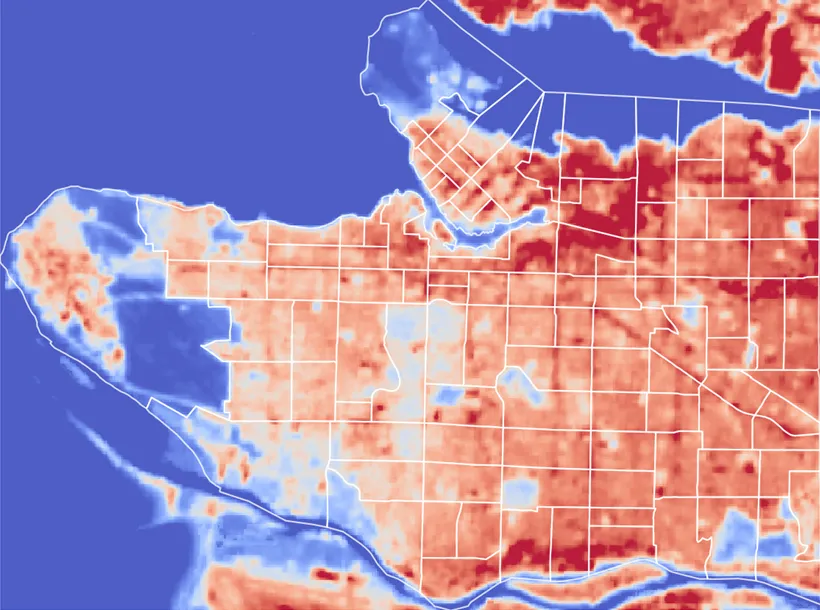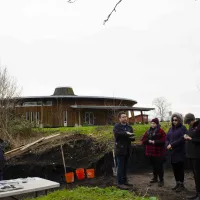SCARP's Master of Community and Regional Planning trains you to transform knowledge into action and to plan in partnership, actualizing comprehensive planning theory to support the well-being of communities, improving built and natural environments, and planning for transformational change.
While still a student, you'll be given real-world problems in the community to plan and solve in partnership with organizations in consulting relationships. You'll be honing your skills, building your professional identity, and forging your first professional network all at the same time.
Read this page and still have questions?
You can email admissions@scarp.ubc.ca with anything that still isn't clear. Or you can attend one of SCARP's or UBC's admissions infosessions. (Click here to see what's coming up!)
Interested in Indigenous Community Planning?
Learn more about our ICP concentration here
Not only are UBC grads the #3 most employable in Canada...95+% of MCRP grads secure Planning-related employment within 1 year of graduating!
Our curriculum addresses the biggest challenges facing the world today, including climate change, systemic injustice, decolonizing professional planning, and healing Indigenous partnerships.
Graduates of this internationally accredited program are recognised and sought out by organisations that protect and improve communities, from city halls to transportation authorities to social justice organisations. As MCRP is the only master’s degree in Planning accredited in both Canada and the United States, graduates are qualified to work as planners in Canada, the U.S., and any other country that recognizes Canadian and American planning accreditation.

Areas of impact and expertise

Environment and climate change
Severe impacts of climate change are being felt everywhere, including street flooding, hotter and drier summers, and wildfire smoke, and are projected to get stronger. Beyond energy efficiency and ecological harm reduction, sustainable communities are ecosystems of harmony between developing and nature. We work to prevent impacts of climate change, while working to heal what's already in crisis.

Housing equity
Working towards socio-economic equality helps people access housing, employment, health, education, energy, transportation and everything you access from mobility, and even food. Learn how access to good housing can address equality crises everywhere.

Hazard resilience and disaster planning
How a region and its community can build resilience to risk and disaster in cities, coasts, marine transportation, and beyond. Disaster planning bridges engineering, natural sciences, and social sciences to understand risk, response, recovery, and the impact on communities. Learn how each population and each community is disproportionately affected, and how well-planned infrastructure and disaster response can heal these divides.

Indigenous Community Planning
ICP trains a new generation of planners to break with colonial tradition in respectful partnership with Indigenous communities, centered on their priorities. SCARP's ICP program, MCRP's only formal concentration, immersively teaches a blend of Indigenous Knowledge and Indigenous Planning with contemporary planning methods.

Transport access
Decisions regarding the shape of our communities and its supporting transportation infrastructure, services, information, policies, and oversight can help enable the ‘good’ cities we strive for. Transportation planning has decisive ramifications for not just the overall productivity of a region, but affordability, socioeconomic self-determination, housing, climate, and land rights.

Urban studies
Urban Studies furthers understanding of the forces that shape cities and how to redirect those forces. Urbanization has shaped and continues to shape the processes of social and environmental change. Explore how urban processes change societies and shape human relationships to each other and nature, how cities interrelate to each other through flow of people commodities money and ideas, and how tomorrow's cities lead to more sustainability and equity.
Each challenge met by planners has elements of all the above sub-fields.
Every community or regional crisis affects marginalised peoples first and foremost,
and therefore every plan begins and ends with how to include everyone in that plan and in its rewards.
Careers in planning
Likewise, graduates from MCRP work in a wide range of successful and influential careers, from international organizations to local non-profits, from public to private, and including federal, provincial and municipal governments. With a 95% post-graduation planning-employment rate, SCARP's MCRP program not only has something to teach experts from any number of fields, and opens doors for you across all kinds of sectors.
Here's a Where Are They Now of some recent graduates:

Eanimi Agube, grad 2023
First job after graduation:
Planning and Development Intern, County of Wetaskiwin
"SCARP has truly been a transformative journey for me, opening doors to the captivating realm of urban planning. Throughout my time with SCARP, I dedicated myself to finding the paths in which my interests lie and where I could make the most impact in this dynamic field. During these two years, I have had the opportunity to meet people from many places, who have shared knowledge of their lived experiences that I continue to carry along with me as I start a career. Undoubtedly, SCARP stands out as the ultimate hub to delve into the multifaceted world of planning. The swift passage of two years was filled with invaluable insights, cherished moments, and lasting camaraderie."

William Canero, grad 2022
First job after graduation:
Systems Change Coordinator, Collingwood Neighbourhood House Society
"PLAN425: Urban Issues and Concepts, articulated everything I had come to identify as issues in public policy and was the driving force to apply for my master’s degree in Community and Regional Planning. Justice, Equity, and Inclusion appear in various facets of urban planning, and I wanted to learn more about what needs my community had."

Tadayori Nakao, class of 2019
First job after graduation:
Deputy Director, Ministry of Land, Infrastructure, Transport and Tourism, Japan
Now First Secretary, Embassy of Japan in Malaysia
"The way I learned in MCRP courses and exercised in the planning studio has been instrumental to actual policymaking situations today. SCARP also allowed me to deepen technical knowledge and develop research skills in transportation planning. Those skills have been useful to my work after graduation.”

Jean Roe, class of 2020
First job after graduation:
Planner, MODUS Planning, Design & Engagement
"SCARP equipped me with values, curiosity, and skills to embark on a career path as a planner. My learnings at grad school, from urban design theory and Indigenous community planning practices, to engagement techniques and policy best practice, helps me daily at work. I'll also always be grateful for the people I met while at SCARP -- many of whom are now my colleagues and close friends."

Dawn Smith, class of 2021
First job after graduation:
Policy Analyst (now Sr Policy Analyst), BC Public Service
"MCRP's Indigenous Community Planning Program taught the skills and insights I needed to take up my work to decolonize planning, and support other non-Indigenous professionals in putting our labour and minds to meeting the challenge of reconciliation. I'm proud of my time at SCARP, and the path that it has put me on in the public service."

Tyler Tichenor, class of 2022
First job after graduation:
Pre-Development Planner, New York Department of Housing Preservation and Development
"There is definitely a lively and honestly accessible planning community in Vancouver. SCARP helps connect you with that professional community. You have the opportunity to see what all the world of planning has to offer and decide what it is you are really passionate about."
Program Structure, Content, and Requirements
What's involved
- A 2-year program, whose required courses are pre-scheduled (details below)
- 42 credits in required courses, tailored to the evolving demands of the planning profession
- 18 credits of elective courses you select based on interests and professional aspirations
- A second-year 2-term studio course that integrates theories and methods covered throughout the curriculum into a single team-based project, with a real client or community group
- Internship experience and mentorship opportunities with local planning practitioners
Build your Masters degree in your own vision
Beyond a core sequence based on what you need to know as a planner in a changing world, you’ll customize your degree to your own interests and aspirations.
- Choose your own locus of courses to craft your particular lens into the world of planning
- You can choose to go further in depth with a lens into Indigenous communities, priorities, and partnership experience with SCARP’s Indigenous Community Planning concentration
- If you have an independent project in the works or your own unique inquiry, design your own SCARP course, outline, and milestones, for 3 credits in our Directed Studies course (PLAN 550A / PLAN 550B)
Read below for full details.
Required Courses
Note: updated as of June 2025
| Code | Credits | Description | Required for MCRP? | Required for MCRP-ICP? |
|---|---|---|---|---|
| PLAN 500 | 3 | Comparative Perspectives on Planning History and Futures | X | X |
| PLAN 501 | 3 | Reconciliation and Planning | X | |
| PLAN 502 | 3 | Sustainability and Resilience in Planning | X | X |
| PLAN 504 | 3 | Urban Design and Visual Representation | X | X |
| PLAN 505 | 3 | Planning Theory, Values, and Ethics | X | X |
| PLAN 506 | 3 | Information and Analysis in Planning | X | X |
| PLAN 507 | 3 | Engagement and Facilitation for Planners | X | X |
| PLAN 511 | 3 | The Legal and Institutional Context of Planning | X | X |
| PLAN 512 | 3 | Urban Economics, Infrastructure, and Real Estate Issues in Planning | X | |
| PLAN 513 | 3 | Making and Implementing Community and Regional Plans | X | |
| PLAN 514 | 3 | Indigenous Planning: Ways of Being, Knowing, and Doing | X | |
| PLAN 515 | 3 | Indigenous Law, Governance, and Community Planning | X | |
| PLAN 516 | 3 | Planning for Community Economic Development | X | |
| PLAN 527 | 3 | Internship | X | |
| PLAN 540 | 3 | Planning Praxis | X | |
| PLAN 541 | 6 | Planning Studio | X | |
| PLAN 543 | 12 | Indigenous Community Planning Practicum | X | |
| TOTAL CREDITS (not including elective requirements): | 42 | 42 | ||
| ELECTIVE COURSES (no more than 6 credits may be at the undergraduate level, i.e., 300/400): | 18 | 18 | ||
| TOTAL CREDITS: | 60 | 60 | ||
Electives
Electives can be courses (within SCARP or in other departments) that relate to your interests and can count towards your MCRP program course requirements.
There are many possibly advantageous or relevant electives that may serve to complement and broaden your understanding of planning issues. Please talk to your faculty advisor, who may have advice depending on your particular lens on planning.
Please note:
- Some courses require you contact the course instructor and/or department offering the course for permission to be registered
- Course offering and availability are subject to change by the School offering the course.
- No more than 6 credits of undergraduate-level (300-400) courses will count towards your MCRP program.
- Courses can potentially be taken at other universities through the Western Deans' Agreement.
- Please make decisions about whether to take SCARP, UBC, or non-UBC courses in consultation with your faculty advisor. SCARP's established electives have a diverse and comprehensive array of lenses into the world of planning.
Electives as developing expertise
MCRP students sometimes want to develop additional expertise in subject areas that are covered in MCRP core courses. One way to develop such expertise is to take elective courses that address subject areas that are covered in the core courses.
To help guide MCRP students in their selection of electives, the following table indicates elective courses that address subject areas that are covered in core courses. Each core course (numbered from 500 to 513) indicates at least one elective course that relates to the core course.
Remember that electives are subject to availability term by term.
| 500 | 501 | 502 | 504 | 505 | 506 | 507 | 511 | 512 | 513 | |
|---|---|---|---|---|---|---|---|---|---|---|
| 321 | X | |||||||||
| 331 | X | |||||||||
| 341 | X | |||||||||
| 351 | X | |||||||||
| 361 | X | |||||||||
| 425 | X | |||||||||
| 514 | X | |||||||||
| 515 | X | X | ||||||||
| 516 | X | |||||||||
| 530 | X | |||||||||
| 531 | X | |||||||||
| 532 | X | |||||||||
| 535 | X | |||||||||
| 548G | X | |||||||||
| 548L | X | |||||||||
| 548M | X | |||||||||
| 548O | X | |||||||||
| 548R | X | |||||||||
| 548S | X | |||||||||
| 579 | X | |||||||||
| 580 | X | |||||||||
| 583 | X | |||||||||
| 587A | X | |||||||||
| 587B | X | |||||||||
| 602 | X |
Course Scheduling and choices
General MCRP
Year 1 Term 1 | Year 1 Term 2 | Year 1 Summer | Year 2 Term 1 | Year 2 Term 2 | Year 2 Summer |
|---|---|---|---|---|---|
PLAN 500 | PLAN 505 |
| PLAN 512 | ||
PLAN 501 | PLAN 506 |
| PLAN 513 | ||
PLAN 502 | PLAN 507 |
|
| ||
PLAN 504 | PLAN 511 |
| ----------PLAN 541----------- | ||
| ------------------------------------PLAN 540------------------------------------ | |||||
PLAN 527A/527B [flexible timeline] | |||||
Elective(s) | Elective(s) | Elective(s) | Elective(s) | Elective(s) | Elective(s) |
ICP Concentration
Year 1 Term 1 | Year 1 Term 2 | Year 1 Summer | Year 2 Term 1 | Year 2 Term 2 | Year 2 Summer |
|---|---|---|---|---|---|
PLAN 500 | PLAN 505 | PLAN 516 |
| PLAN 511 |
|
PLAN 502 | PLAN 506 |
| ---------------PLAN 543--------------- | ||
PLAN 504 | PLAN 507 |
|
|
|
|
PLAN 514 | PLAN 515 |
|
|
|
|
Elective(s) | Elective(s) | Elective(s) | Elective(s) | Elective(s) | Elective(s) |
Concentrations and areas of focus
Beyond the common foundation provided by the MCRP core courses, students may choose to gain expertise and experience in a particular domain of planning. While some students will elect to pursue a pre-structured Area of Concentration, others may customize a focus area to reflect their interests.
Whether formal or informal, if developing a focus area or AoC students should select a suite of appropriate courses (minimum 12 credits) in consultation with their faculty advisor. As a general guideline, we suggest, whether you choose a concentration or not, you immerse yourself in a combination of courses reflecting broad knowledge, specific skills, in-depth knowledge, and perhaps field experience.
Concentrations
SCARP's only official concentration option is Indigenous Community Planning (ICP). You may speak to your Faculty Advisor regarding the prospect of a custom area of focus for your degree, suited to your needs and interests.
Learn more about our ICP program
Informal Areas of Focus
Comparative Development Planning
The Comparative Development Planning area of concentration represents critical analysis of the development/governance logics, processes, and policies shaping local conditions with respect to ongoing urban transition. The scope of this analysis includes local, regional, national, and global scales.
Comparative Development examines the importance of local knowledge, cultural specificity, and relevance of local political, social, and economic structures and forces, as well as their consequences for local trajectories of socioeconomic change and development. It covers the range of factors (e.g., elites, politics), forces (e.g., agency, capitals, modes of accumulation) and institutions (e.g., states, markets, communities, organizations) whose origins lie beyond the local.
This AoC prepares MCRP students for careers in the fields of local, national, regional, and international development planning, at various levels of:
- Governance
- Multilateral and bilateral development agencies
- Philanthropic foundations
- Volunteer-based organizations
- Social enterprises
- Non-profits
- Non-government and corporate organizations
Environmental Planning
Environmental Planning is concerned with the interaction of human settlements and the natural environment. Communities and governments make many decisions, policies, and plans that have profound impacts on the health and integrity of social and ecological systems. Environmental Planning responds to this problem, with an overarching goal of helping planners design human settlements in a way that minimizes impacts on natural ecosystems and minimizes risks to humans.
In addition to a general Environmental Planning AoC, some options for customized AoCs include: Disaster and Risk Management Planning; Environment and Infrastructure Planning; and Environment and Health Planning.
This AoC prepares MCRP students for careers in environmental planning at various levels of government, non-profit organizations, and consulting companies. Graduates of this area have worked in such areas as sustainability planning, climate change adaptation planning, and disaster resilience planning.
Social Planning and Policy for Inclusive Communities
Social Policy and Planning for Inclusive Communities is concerned with the always-uneven impacts of economic growth and change, and thereby of developing innovative ways of addressing urban and regional inequalities. It is also concerned with life-cycle planning issues such as child friendly cities and aging in place. From affordable housing and homelessness to the social integration of immigrants, urban Indigenous voice and wellbeing, accommodating transgender needs and more, the overarching goal is to support the development of inclusive, non-discriminatory communities.
This AoC prepares MCRP students for careers in social planning at various levels of government, Indigenous-serving organizations and communities, philanthropic foundations, volunteer-based organizations, social enterprises, and non-profits such as the Social Planning & Research Council of BC.
In addition to a general Social Planning & Policy for Inclusive Communities AoC, some more options for customized AoCs include:
- Housing Policy
- Indigenous Planning
- Feminist Planning
- Life Cycle Planning
- Food Security and Sovereignty
- Immigrant & Refugee Integration
- Inclusive Public Engagement
- Advocacy Planning
Transportation Planning
Transportation Planning is a field of expertise concerning the development of goals, policies, designs, and programs to facilitate the movement of people and goods; at scales ranging from a single street to an entire country.
Transportation planners seek to implement participatory processes through which diverse stakeholders can bring their knowledge, experience, and values to the development of transportation plans. Transportation planning considers a wide array of positive and negative transport system impacts, including community vitality, economic resilience, human health, and the natural environment.
In addition to a general Transportation Planning AoC, some options for customized AoCs include: Transportation Planning and Health, Transportation and Land Use Planning, and Transportation and Urban Design.
This AoC prepares MCRP students for careers in transportation planning at various levels of government, non-profit organizations, and consulting firms. Graduates of this area have gone on to work in planning departments at various municipalities, transit agencies, and transport consultancies.
Urban design
The study of urban design is one of the fastest growing fields in North American planning schools. New urban design concentrations and degree programs are appearing in many schools, to help create urban communities in which people can live, work, learn, play and recreate. This is an antidote to the large lots of single-family homes that are a car trip away from everything and that have come to characterize urban sprawl. Contemporary urban designers are conscious of the holism necessary for improving transit functions, public health, place-making, providing ecological services, and creating a lively public realm and livable neighbourhoods. Urban design, together with transportation planning, play a direct role in shaping the quality of life or urban dwellers.
The main objective of the Urban Design concentration is to give SCARP students interested in urban design a set of fundamental theories, models and planning tools that can help them understand and shape the built environment. Faculty in SCARP have considerable expertise in urban design both as a stand-alone discipline and as an integral part of larger city making processes. The concentration at SCARP is particularly focused on the integration of social, ecological, hydrological, energy and transportation systems into urban design thinking. Courses are applied and typically include real projects with real clients working in current problems in nearby communities.
Learning outcomes
MCRP's Learning outcomes represent each skill and understanding we will help you become by graduation.
These outcomes are at the core of what makes MCRP an accredited degree, and MCRP graduates are highly regarded in the industry.
MCRP Learning Outcomes
1. Knowledge of Planning Fundamentals
SCARP anticipates that MCRP graduates will possess awareness and/or fundamental knowledge of:
- 1.1 current and emergent planning-related problems and trends transpiring at local and global scales
- 1.2 planning as a collective and action-oriented framework designed to enhance life on Earth
- 1.3 human-environment interactions, including an understanding of planning’s role in addressing the environmental, economic, and social impacts of human behaviour
- 1.4 planning for one or more dimensions of human society, such as land use, transportation, housing, urban design, environmental and risk management, and/or economic development
- 1.5 the public interface of planning, including how knowledge, beliefs, emotions, and values interact to shape decisions and outcomes
- 1.6 historically significant events and concerns in planning, including their lessons and legacies for current and future planning practice
- 1.7 the distinguishing features of non-Western (including Indigenous) planning practice and traditions that are carried out under different cultures, worldviews, and governance systems
2. Skills to Support Professional Planning Practice and Collaborative Decision-Making
SCARP anticipates that MCRP graduates will be able to effectively:
- 2.1 collect, analyse, interpret, and utilize planning-related information (such as numerical, text-based, and spatial data) from a variety of sources
- 2.2 prepare and communicate planning-related information in professional planning products (such as plans, proposals, policy papers, and public reports) through the use of written, verbal, and visual technologies and tools
- 2.3 anticipate potential societal change and identify the associated implications for planning preparedness and resilience
- 2.4 evaluate and apply planning instruments to address current and future planning-related problems in a range of public, private, and non-governmental settings
- 2.5 facilitate planning and decision-making processes, helping to engage with, mediate, and resolve conflicts among diverse stakeholder groups
- 2.6 perform a range of planning roles (such as leadership, technical support, and administration), including cooperation in team settings where skillsets, personalities, values, and opinions vary
- 2.7 initiate and sustain collaborative partnerships with various entities toward defining, scoping, and addressing planning-related needs in addition to successful project delivery
3. Attitudes for Ethical and Reflexive Professional Planning Practice
SCARP anticipates that MCRP graduates will display the capacity and commitment to:
- 3.1 conduct professional planning practice as an ethical and reflexive planner
- 3.2 serve as leaders and agents of change for improving environmental, economic, and social outcomes of current and future generations
- 3.3 support underserved communities, with a particular concern for social justice
- 3.4 demonstrate respect for individual differences relating to gender, race, ethnicity, socioeconomic status, and other dimensions of personal identity
- 3.5 cultivate awareness of the wider world and develop a sense of their roles as professional planners within this broader context
- 3.6 possess self-awareness in relation to personal values and biases, and their potential impact on professional practice
- 3.7 pursue life-long learning from a position of curiosity about natural and human environments
Program Fees
- MCRP students are assessed a Program Fee for full-time studies according to the Specialized Master’s Degree Programs schedule as noted in the UBC Calendar (for Professional Masters fee). The Program Fees are calculated for full academic years (Winter and Summer Sessions; September through August).
- As the fees represent installments of the cost for the whole program and not for each semester, you are required to pay a total of 6 installments of the Program Fee (6 terms over 24 months) regardless of whether or not you complete your program earlier.
-Please remember as of your graduation you no longer have student status. As a result, in the event you complete your program early, you will no longer be eligible to access any funding from awards or student loans to pay for outstanding installments. It is your responsibility to make necessary academic and financial plans. You can contact your Enrolment Services advisor for more information. - You are assessed the Program Fee three times a year, payable in September, January and May through the UBC Student Service Centre.
- In addition to the Program Fee, all UBC students are assessed Student Fees to help cover the costs of resources available to students. Some student fees of particular importance to graduate students
- The UBC Faculty of Graduate and Postdoctoral Studies (G+PS) provides information about the cost of living in Vancouver for prospective students.
In addition to the program fees, entering the program requires a one-time $1,500 deposit. Please note it is only due upon acceptance into the program, and the deposit is applied directly towards your program fees.
Awards before you enroll
Awards prospective students are eligible to apply for include:
This tab is what you need to know about eligibility to apply and how to apply.
Please review all information on requirements before you proceed here.
Applications open | November 1 |
Applications close | January 5 |
Referee deadline | January 12 |
Video interview process | Late February |
Receive official response to your application | Mid-March |
What you need to know to enroll
- Admission requirements are set by UBC's Faculty of Grad and Postdoctoral Studies.
More information - Applicants admitted to the program will commence full-time studies in September. The School of Community and Regional Planning does not admit students at any other time of year.
Other Frequently Asked Questions
Should I chose MCRP or a SCARP Research Masters?
| MCRP | MAP/MScP | |
|---|---|---|
| Number of students admitted annually | 35-40 | 6-8 |
| Credits required for degree completion | 60 | 34 |
| Core course requirement | 18 | 10 |
| Thesis/project | practicum report | 12-credit thesis |
| Accreditations | Accredited by UBC, and by Canadian and American professional planning boards | Accredited by UBC |
| Other program requirements / information |
|
|
| Cross-benefits | Can lead to professional planning practice, and accreditation | Can lead to further research (through PhD) |
Is it necessary to have a background in planning in order to apply to the MCRP?
No. The students admitted to the MCRP program come from a variety of backgrounds. It’s not necessary to have a background in Planning or any particular field to be considered for the program.
For example, here are the backgrounds of MCRP students from recent years:
MAJOR
- Anthropology
- Architecture & Urbanism
- Development Studies
- Environment & Development
- Gender, Race, Sexuality & Social Justice
- Environmental Earth Sciences
- Geography
- Geography & Environmental Studies
- Geography & Urban Development Studies
- History
- Interdisciplinary Studies
- Law
- Knowledge Integration
- Landscape Planning
- Life Sciences
- Marketing & Real Estate
- Native Studies
- Natural Resources Conservation
- Mathematical Engineering
- Management Information Systems & Marketing
- Peace, Conflict & Justice
- Political Science
- Project Management
- Psychology
- Sustainable Studies
- Urbanism
- Urban Studies
PREVIOUS DEGREE EARNED
- Bachelors of Architectural Studies
- Bachelors of Arts
- Bachelors of Arts (Honours)
- Bachelors of Commerce
- Bachelors of Environmental Design
- Bachelors of Kinesiology
- Bachelors of Knowledge Integration (Honours)
- Bachelors of Science
- Civil Engineering
- Juris Doctor
- Masters of Arts
- Masters of Business Administration
Does the MCRP have a part-time option?
No. The MCRP is a 24 consecutive month full-time program.
Does the MCRP have graduate courses that can be done by distance or online?
No. SCARP does not offer any distance education or online courses.
How can I enhance my application?
- Be sure your referees will write a strong letter of recommendation: The Faculty of Graduate and Postdoctoral Studies at UBC has a guide available to supervisors to assist them in writing strong letters of recommendation. Use this document as a guide to select your referees and to prepare them for writing a letter on your behalf. Strong letters of reference should provide specific examples of your demonstrated abilities.
- Write a strong statement of intent. The MCRP admission page outlines the points to be included in your statement. Prepare your statement carefully.
- Consider volunteering or finding a job shadow. If you don’t have a lot of experience in the planning profession, consider volunteering with an organization or arrange a job shadow to get better insight. Use this experience to inform your statement of intent and include it on your resume.
- If your GPA is close to the minimum, consider writing the GRE. Although the GRE is not required, if there are any obvious gaps in your academic record, it will provide the admissions committee with another data point to consider your academic potential.
Can I receive feedback on my application if I am not admitted?
No. SCARP does not provide individualized feedback on applications. If you wish to strengthen your application to apply in a future year, please follow the guidance provided above in the "How can I enhance my application?" section.
What funding opportunities are available to applicants?
- Awards and other funding opportunities open to SCARP students are posted on the Student Funding and Awards page of the SCARP website.
- The UBC Faculty of Graduate and Postdoctoral studies maintains a database of award opportunities open to UBC graduate students.
- International students are encouraged to seek funding opportunities from their home countries.
Do I owe less money if I finish my program early?
The MCRP is a 24-month program. You will be billed in 6 installments over 24 months, even if you complete your program early.
Remember, once you graduate you’re no longer a “student”. Because of this, if you are receiving financial assistance from UBC, and you finish early, you will not have student status during your 6th installment and will not be able to access awards or loans to pay it.
What are the minimum GPA requirements for admission?
SCARP adheres to the minimum academic requirements established by the UBC Faculty of Graduate and Postdoctoral Studies:
My application doesn’t meet the minimum standards for admission. Can I still apply or will my application be disqualified?
SCARP welcomes all candidates that would succeed in and contribute to the program and the School. Generally, a brief explanation of why your application does not meet the minimum standards will justify to the admissions committee why they should consider your application. The admissions committee considers all applications as a whole, and does not automatically dismiss applications based on single criteria.
Applicants should note that admission to the MCRP is very competitive. Each year the number of applicants far exceeds the number of spaces available. Meeting the minimum standards of admission does not guarantee admission to the program.
Is the GRE recommended?
The GRE is only recommended in situations where an applicant’s GPA is close to the minimum and does not reflect the applicant’s true academic potential. If there are any obvious gaps in an applicant’s academic record, a strong GRE score will provide the admissions committee with another data point to consider academic ability.
My IELTS/TOEFL score does not meet SCARP’s minimum requirements. Can I still apply or will my application be disqualified?
SCARP is obliged to require that all applicants meet the Faculty of Graduate and Postdoctoral Studies’ English proficiency requirements.
SCARP has higher requirements than the UBC minimums for its degree programs. Although an application would not be rejected outright, not meeting the posted minimums for the IELTS or the TOEFL does place an applicant at a disadvantage. We encourage students who do not meet SCARP’s minimum English proficiency scores to retake the test where possible.
SCARP welcomes all candidates that would succeed in and contribute to the program and the School. The admissions committee considers all applications as a whole and does not automatically dismiss applications based on single criteria.
There has been a change to my CV/resume since the application deadline, can I submit an updated version?
In fairness to all applicants, CV/resume changes will not be accepted after the document deadline in the application.
Can I change my reference?
- Before the reference deadline, you can change your reference via the application portal.
- After the reference deadline, you cannot change your reference.
Can I arrange to submit more than 2 references for my application?
In fairness to all applicants, we will only accept exactly 2 letters of reference for an application.
When will I find out about the status of my application?
Generally, SCARP notifies successful candidates in mid-March, and throughout the month. All applicants are notified of their standing (declined admission or placement on the waitlist) in April.
Can I know my position on the waitlist?
The waitlist is not linear, but comprised of a pool of applicants. There are a number of factors that determine whether a waitlisted applicant will be offered admission. As a result, we are unable to comment on the likelihood waitlisted applicants will be offered admission.
We will notify all waitlisted applicants when the waitlist is closed and we are no longer considering making additional offers of admission.
How do I accept my offer of admission?
Accept your offer through the admissions portal. Contact grad.scarp@ubc.ca if you have any questions about the deadline to respond or conditions placed on your offer.
Where can I get my official acceptance letter?
Official acceptance letters (for records, study permits, etc.) are available through the application portal.
Will UBC mail an official acceptance letter to me?
No. Acceptance letters are available through the application portal.
When will I find out about funding opportunities?
SCARP notifies entrance award recipients with their acceptance letters. If funding becomes available, SCARP will notify successful candidates by email.
If you have inquiries regarding any of the below items, please contact the UBC Faculty of Graduate and Postdoctoral Studies:
- Application fees
- Online application problems
- Minimum academic requirements
- Transcript requirements
- Translations of transcripts
- Letters of Reference
Submitting your Application
The option to submit your formal application will appear on this webpage once the application period begins. (The application schedule is detailed at the top of this webpage.)
Procedure
The Admissions Committee considers many factors in making admissions decisions: academic preparation, academic capability, experience, and fit with the School.
Please note that due to the volume of documents received we are unable to confirm receipt of documents by email or phone. Please check your online application regularly for updates.


